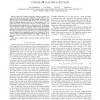159
click to vote
INFOCOM
2012
IEEE
13 years 4 months ago
2012
IEEE
—Location sharing is a fundamental component of mobile online social networks (mOSNs), which also raises significant privacy concerns. The mOSNs collect a large amount of locati...
127
click to vote
ICASSP
2011
IEEE
14 years 5 months ago
2011
IEEE
Abstract—This paper considers cooperative sensing in cognitive networks under Spectrum Sensing Data Falsification attack (SSDF) in which malicious users can intentionally send f...
121
click to vote
SOCIALCOM
2010
14 years 12 months ago
2010
As the value of reputation systems is widely recognized, the incentive to manipulate such systems is rapidly growing. We propose TAUCA, a scheme that identifies malicious users and...
132
click to vote
JSAC
2008
15 years 2 months ago
2008
If a network is to operate successfully, its users need to collaborate. Collaboration takes the form of following a network protocol and involves some resource expenditure on the p...
104
click to vote
CORR
2010
Springer
15 years 2 months ago
2010
Springer
: Malicious users try to compromise systems using new techniques. One of the recent techniques used by the attacker is to perform complex distributed attacks such as denial of serv...
107
click to vote
CMS
2006
15 years 3 months ago
2006
Abstract. Although privacy is often seen as an essential right for internet users, the provision of anonymity can also provide the ultimate cover for malicious users. Privacy Enhan...
121
click to vote
ACSAC
1998
IEEE
15 years 6 months ago
1998
IEEE
System protection mechanisms such as access controls can be fooled by authorized but malicious users, masqueraders, and misfeasors. Intrusion detection techniques are therefore us...
119
click to vote
WIDM
2005
ACM
15 years 7 months ago
2005
ACM
Collaborative filtering techniques have been successfully employed in recommender systems in order to help users deal with information overload by making high quality personalize...
122
click to vote
ACNS
2006
Springer
15 years 8 months ago
2006
Springer
Unstructured P2P systems have gained great popularity in recent years and are currently used by millions of users. One fundamental property of these systems is the lack of structu...
114
click to vote
INFOCOM
2007
IEEE
15 years 8 months ago
2007
IEEE
—Unstructured networks (like ad-hoc or peer-to-peer networks) are networks without centralized control of their operation. Users make local decisions regarding whether to follow ...

